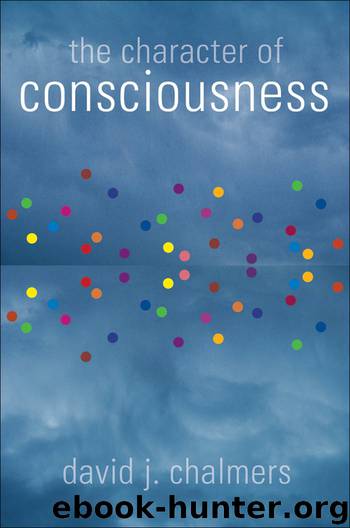The Character of Consciousness by Chalmers David J

Author:Chalmers, David J.
Language: eng
Format: epub
Publisher: Oxford University Press, USA
Published: 2007-03-19T16:00:00+00:00
(ii) Second Horn: P&~C Is Not Conceivable
Premise 2 says that if P&~C is not conceivable, then C cannot explain our epistemic situation. The case for this premise is not quite as straightforward as the case for premise 1. One can put the case informally as follows:
4. If P&~C is not conceivable, then zombies satisfy C.
5. Zombies do not share our epistemic situation.
6. If zombies satisfy C but do not share our epistemic situation, then C cannot explain our epistemic situation.
____________________
7. If P&~C is not conceivable, then C cannot explain our epistemic situation.
Strictly speaking, the references to zombies should be put within the scope of a conceivability operator. One can formalize the argument in this fashion, but for now I use the informal version for ease of discussion.2
Here, premise 6 is simply another application of the connection between conceivability and explanation. Premise 4 might be derived from a principle of completeness about the conceivable (if R is conceivable, then for arbitrary S, either R&S is conceivable, or R&~S is conceivable). But in this context, one can also defend premise 4 more straightforwardly by noting that if the truth of C is) transparently explained by P, as the first horn requires, then if we specify that P holds in a conceivable situation, it will follow transparently that C holds in that situation.
The real work in this argument is done by premise 5. This premise amounts to the claim that P&~E is conceivable, where E characterizes our epistemic situation. To clarify this premise further, one needs to clarify the notion of our epistemic situation.
I will take it that the epistemic situation of an individual includes the truth values of their beliefs and the epistemic status of their beliefs (as justified or unjustified and as cognitively significant or insignificant). As before, an epistemic situation (and a sentence E characterizing it) should be understood in topic-neutral terms, so that it does not build in claims about the presence of phenomenal states or phenomenal concepts. We can say that two individuals share their epistemic situation when they have corresponding beliefs, all of which have corresponding truth values and epistemic status.
A zombie will share the epistemic situation of a conscious being if the zombie and the conscious being have corresponding beliefs, all of which have corresponding truth values and epistemic status. Here, I assume an intuitive notion of correspondence between the beliefs of a conscious being and the beliefs (if any) of its zombie twin. For example, corresponding utterances by a conscious being and its zombie twin will express corresponding beliefs. It is important to note that this notion of correspondence does not require that corresponding beliefs have the same content. It is plausible that a nonconscious being such as a zombie cannot have beliefs with exactly the same content as our beliefs about consciousness. We can nevertheless talk of the zombie’s corresponding beliefs. So the claim that a zombie and a conscious being share their epistemic situation does not require that their beliefs have the same content.
Download
This site does not store any files on its server. We only index and link to content provided by other sites. Please contact the content providers to delete copyright contents if any and email us, we'll remove relevant links or contents immediately.
When Breath Becomes Air by Paul Kalanithi(7263)
Why We Sleep: Unlocking the Power of Sleep and Dreams by Matthew Walker(5641)
Paper Towns by Green John(4169)
The Immortal Life of Henrietta Lacks by Rebecca Skloot(3826)
The Sports Rules Book by Human Kinetics(3588)
Dynamic Alignment Through Imagery by Eric Franklin(3488)
ACSM's Complete Guide to Fitness & Health by ACSM(3467)
Kaplan MCAT Organic Chemistry Review: Created for MCAT 2015 (Kaplan Test Prep) by Kaplan(3422)
Introduction to Kinesiology by Shirl J. Hoffman(3299)
Livewired by David Eagleman(3121)
The River of Consciousness by Oliver Sacks(2992)
Alchemy and Alchemists by C. J. S. Thompson(2911)
The Death of the Heart by Elizabeth Bowen(2901)
Descartes' Error by Antonio Damasio(2731)
Bad Pharma by Ben Goldacre(2729)
Kaplan MCAT Behavioral Sciences Review: Created for MCAT 2015 (Kaplan Test Prep) by Kaplan(2491)
The Gene: An Intimate History by Siddhartha Mukherjee(2491)
The Fate of Rome: Climate, Disease, and the End of an Empire (The Princeton History of the Ancient World) by Kyle Harper(2436)
The Emperor of All Maladies: A Biography of Cancer by Siddhartha Mukherjee(2430)
